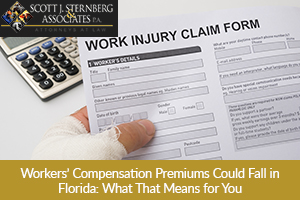Later this month Florida Insurance Commissioner David Altmaier is supposed to decide on a fling by the National Council on Compensation Insurance that calls for an average 9.3% reduction in workers’ compensation premiums in the coming year. The recommendation includes a 10.3% reduction in premiums for manufacturing businesses and an 11.3% decrease for clerical businesses. This comes after businesses were hit with 14.5% increase last year after an NCCI-recommended increase that exceeded 19%. New data shows that Florida businesses paid nearly $3.8 billion in workers’ compensation premiums in 2016, which was up from about $2.8 billion in 2012.
What Does This Decrease in Workers’ Compensation Premiums Mean for Business Owners?
Falling premiums mean that business owners will be paying less for workers’ compensation, which is good for their bottom line. This is especially good news for company owners since they were expecting premiums to continue to rise like they did last year thanks to a recent Florida Supreme Court ruling. From The Orlando Sentinel:
In 2003, with Florida facing some of the highest premiums in the country, the Legislature passed a sweeping rewrite of the workers’ compensation system that, among other things, tied the recovery of plaintiff attorneys’ fees to percentages of the amount of recovered benefits. Workers’ compensation judges were precluded from awarding additional hourly fees for plaintiffs’ attorneys.
In a 2016 ruling known as Castellanos v Next Door Company, the Florida Supreme Court said the strict fee caps violated injured workers’ due process rights and authorized judges to award fees outside the fee schedule if adhering to it yielded unreasonable results.
This ruling lead to the NCCI – which files workers’ comp claims for all insurance carriers in the state – to ask for the nearly 20% increase in premiums last year. Worries about what rising premiums could do to the state’s economy promoted many to call for the legislature to do something to curtail the rise, something similar to the actions taken in 2003, but with better legal standing.
What Does This Mean for Employees?
As you might expect, rising expenses for businesses will have an effect on the lives of their employees. When expenses go up, companies look for other ways to cut costs, like layoffs and not hiring people In the first place. Conversely, when costs go down, companies begin to look for ways to take advantage of that by expanding. A company could also decide that rising workers’ comp premiums mean they have to fight claims harder or put more efforts into the safety of their workplace.
What Does This Mean for Customers?
And what if you are a consumer in Florida, what do this premium shifts mean for you? As mentioned earlier, business owners with rising expenses look for ways to cut costs. Failing that, they also consider raising their prices. Higher prices mean more out of pocket from you, the consumer.
If you are an employee that has been injured at work and you have more questions about workers’ compensation, contact the attorneys at Sternberg | Forsythe, P.A. for a free consultation about your case.
Additional Reading:
You Need a Workers’ Comp Attorney, Even If You Are Injured While on the Clock
Slip and Fall Injury Outside the Office – Are You Covered by Workers’ Compensation?

